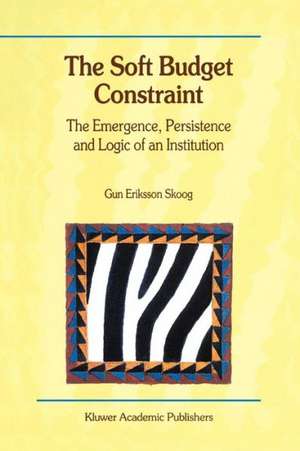The Soft Budget Constraint — The Emergence, Persistence and Logic of an Institution
Autor Gun Eriksson Skoogen Limba Engleză Paperback – 2 dec 2010
| Toate formatele și edițiile | Preț | Express |
|---|---|---|
| Paperback (1) | 950.52 lei 6-8 săpt. | |
| Springer Us – 2 dec 2010 | 950.52 lei 6-8 săpt. | |
| Hardback (1) | 956.69 lei 6-8 săpt. | |
| Springer Us – 29 noi 2000 | 956.69 lei 6-8 săpt. |
Preț: 950.52 lei
Preț vechi: 1159.17 lei
-18% Nou
Puncte Express: 1426
Preț estimativ în valută:
181.90€ • 197.52$ • 152.80£
181.90€ • 197.52$ • 152.80£
Carte tipărită la comandă
Livrare economică 22 aprilie-06 mai
Preluare comenzi: 021 569.72.76
Specificații
ISBN-13: 9781441949936
ISBN-10: 1441949933
Pagini: 424
Ilustrații: XIX, 400 p.
Dimensiuni: 155 x 235 x 22 mm
Greutate: 0.59 kg
Ediția:Softcover reprint of the original 1st ed. 2000
Editura: Springer Us
Colecția Springer
Locul publicării:New York, NY, United States
ISBN-10: 1441949933
Pagini: 424
Ilustrații: XIX, 400 p.
Dimensiuni: 155 x 235 x 22 mm
Greutate: 0.59 kg
Ediția:Softcover reprint of the original 1st ed. 2000
Editura: Springer Us
Colecția Springer
Locul publicării:New York, NY, United States
Public țintă
ResearchDescriere
This is a story of the soft budget constraint. It seeks an answer to a paradox: the prevalence of the soft budget constraint in spite of the tremendous inefficiencies that it gives rise to, and its persistence in spite of reform of the system of which it is an integral part. The story aims at increasing our understanding of why the phenomenon exists. By studying the case of state in Tanzania before, during and after socialism, an explanation of the owned enterprises emergence, persistence and logic of the soft budget constraint is suggested. This introductory chapter presents an argument showing why this story is worth telling. It discusses the research topic and how the problem it presents is attacked. THE SOFT BUDGET CONSTRAINT The soft budget constraint is today a popular metaphor. Originally it was seen as a characteristic of the socialist system. It refers to the tendency of primarily state-owned enterprises to have their liquidity gaps or losses accommodated by the state, or some other external funding body, and to the resulting expectations of such bail-out. The concept was coined by the Hungarian economist Hmos Kornai. ' He distinguishes between four major forms of external financial assistance that contribute to the soft budget constraint: soft subsidies, soft taxation, soft credit and soft 2 administrative pricing.
Cuprins
I. Introduction. II. An Institutional Approach to the Soft Budget Constraint. III. Emergence During the Establishment of Socialism. IV. Maintenance and Reinforcement During the Crisis. V. Persistence and Change During Institutional Reform. VI. Conclusions. Epilogue: Tanzanian Developments Since 1992. Appendix. References. Index.
Recenzii
`In the fast-growing literature on this phenomenon The Soft Budget Constraint: The Emergence, Persistence and Logic of an Institution by G.E. Skoog opens a new path: this is the first book applying the study of the concept to a developing country. It provides in a lucid style rich empirical material and convincing analysis of the causes and consequences of the soft budget constraint syndrome in Tanzania. Her insights will probably be applicable in many other countries as well.'
János Kornai, Harvard University, USA and Collegium, Budapest, Hungary
János Kornai, Harvard University, USA and Collegium, Budapest, Hungary
















